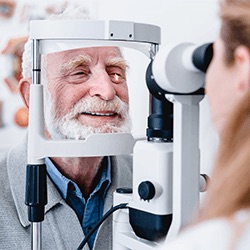Diabetic Retinopathy
What Is Diabetic Retinopathy?
Diabetic retinopathy is a diabetes-related eye condition that affects the blood vessels in the retina, the light-sensitive tissue at the back of the eye. High blood sugar levels can cause these blood vessels to swell, leak, or close off entirely, leading to vision problems and potentially blindness if left untreated. This condition progresses through stages, starting with mild symptoms and potentially advancing to more severe forms that threaten vision. At Retina Associates of St. Louis, our experts are equipped to diagnose and treat diabetic retinopathy, offering comprehensive care to manage this condition effectively. If you’re in St. Louis, MO, have diabetes, and are experiencing vision changes, it’s crucial to seek regular eye exams and appropriate treatment.
What Are the Symptoms of Diabetic Retinopathy?
The symptoms of diabetic retinopathy can vary depending on the severity of the condition, but common signs include:
- Blurred vision
- Difficulty seeing at night
- Seeing floaters or spots in your vision
- Experiencing sudden vision loss
Additionally, as the disease progresses, it may cause blood vessels in the retina to leak or become blocked, leading to distorted or patchy vision. In some cases, there may be no noticeable symptoms in the early stages, which is why regular eye exams are crucial for people with diabetes to detect any changes before significant vision problems occur.
What Are the Causes of Diabetic Retinopathy?
Diabetic retinopathy is caused by prolonged high blood sugar levels that damage the small blood vessels in the retina, the light-sensitive tissue at the back of the eye. Over time, these damaged vessels can leak fluid or blood, swell, or close off entirely, leading to impaired vision. In more advanced stages, new abnormal blood vessels may grow, which are fragile and prone to bleeding, further threatening sight.
How Is Diabetic Retinopathy Treated?
Diabetic retinopathy is treated through various methods aimed at slowing its progression and preserving vision. Treatments are tailored to the severity of the condition. For early stages, managing blood sugar, blood pressure, and cholesterol levels is crucial to prevent further damage. Advanced stages may require medical interventions such as laser therapy, which helps to seal leaking blood vessels and reduce swelling. Injections of anti-VEGF medications can also be administered to decrease macular edema and inhibit the growth of abnormal blood vessels. In some cases, a vitrectomy surgery may be necessary to remove blood from the vitreous gel or repair retinal detachments.
What Are the Risk Factors of Diabetic Retinopathy?
Several factors can increase your risk of developing diabetic retinopathy in St. Louis, MO. The longer you’ve had diabetes, the higher your chances—especially if your blood sugar levels are consistently high. Other common contributors include high blood pressure, high cholesterol, smoking, and kidney disease. Pregnancy may also accelerate progression in women with diabetes. Regular eye exams and proper diabetes management remain the best ways to lower your risk and protect your vision.
Diabetic Retinopathy FAQ
Can diabetic retinopathy be prevented?
While diabetic retinopathy cannot always be prevented, it can often be managed or slowed down with proper diabetes control. Keeping blood sugar levels within target ranges, managing blood pressure and cholesterol, and having regular eye exams are key to preventing vision loss.
Can diabetic retinopathy be reversed?
Diabetic retinopathy cannot be reversed, but early treatment can help manage the disease, slow its progression, and preserve vision. The goal of treatment is to stabilize the retina and prevent further damage. Good control of blood sugar and regular eye exams are vital in managing the condition effectively.
How does high blood pressure affect diabetic retinopathy?
High blood pressure (hypertension) can worsen diabetic retinopathy by putting additional strain on the blood vessels in the retina. Managing blood pressure is essential to prevent further damage to the retina and reduce the risk of vision problems.
Many insurance plans, including private health insurance providers, do cover treatments for diabetic retinopathy. The extent of coverage can vary depending on your specific plan. At Retina Associates of St. Louis, we work with a wide range of insurance companies, and our team can help you understand your benefits and navigate the process. We recommend contacting your insurance provider directly or speaking with our office staff to discuss your coverage options.
Address Diabetic Retinopathy Today
If you have diabetes and are experiencing vision changes, it’s essential to address these symptoms promptly to prevent the progression of diabetic retinopathy. At Retina Associates of St. Louis, our experienced team is dedicated to providing advanced treatments and personalized care to manage this condition effectively. Located in St. Louis, MO, we offer comprehensive eye exams and tailored treatment plans to protect your vision. Contact us today to schedule a consultation and take proactive steps toward preserving your eye health.
*Individual results are not guaranteed and may vary from person to person. Images may contain models.




